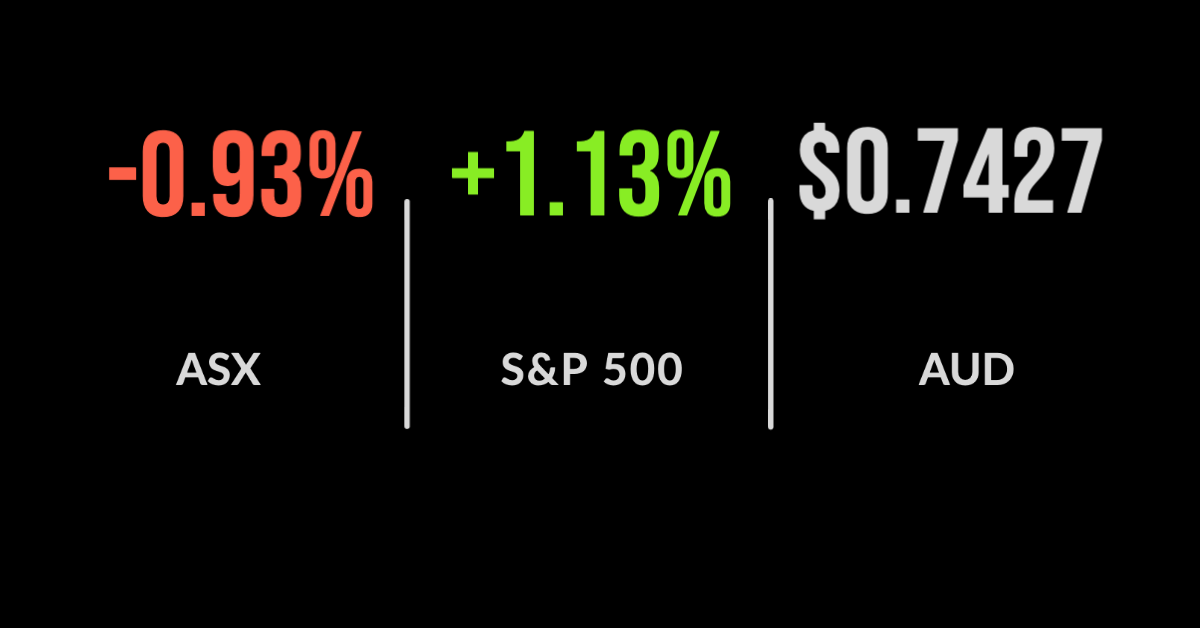ASX falls 0.9% amid Sydney COVID blues
Tech sell off drags ASX, banks, gamblers hit, Solomon ramps up push for Myer board spill
The ASX 200 (ASX: XJO) followed a weak global lead to fall close to 1% on Friday, despite a late afternoon recovery.
Every sector was lower across the board barring energy, which continues to benefit from the impasse between members of OPEC+, at least in the short term.
Viva Energy Group Ltd (ASX: VEA) was a rare highlight, jumping 5.1% after announcing a stronger than expected finish to the half.
The group confirmed a 34% rise in earnings for the second half to between $390 million and $410 million driven by petrol and diesel sales, up 4% and 16%, despite aviation and retail being hit by rolling lockdowns.
Solomon Lew also flagged his impending decision to spill the board of Myer Holdings Ltd (ASX: MYR) as he seeks change at the struggling company. Myer shares jumped 6% on the news.
Over the week, it was the technology and discretionary sectors that pulled the ASX to its worst session, down 0.5%, with the sectors falling 1.7% and 2.7% respectively.
The weakness was driven by both Tabcorp Holdings Limited (ASX: TAH) and Crown Resorts Ltd (ASX: CWN), which fell 8.1% and 7.8%, one due to a costly demerger and the other more machinations at the Royal Commission.
Industrials were the biggest winner, jumping 3.2% on the back of IFM’s offer for Sydney Airport Holdings Pty Ltd (ASX: SYD) which jumped 33.4%.
US cyclicals deliver weekly gain, earnings ahead, airlines jump
US markets broke a losing streak with all three benchmarks over 1% higher, led by the Dow Jones, up 1.4%, the S&P 500, 1.1%, and the Nasdaq 1%.
This was the third straight weekly gain that benefitted from a sell off in bond markets which sent cyclicals higher.
Financials were the biggest beneficiaries with the likes of JPMorgan Chase (NYSE: JPM) jumping 3.2% in the hope that higher bond yields will help boost profit margins.
The rally comes ahead of a reporting season that begins on Monday that is expected to be among the strongest in history.
United Airlines Holdings Inc (NYSE: UAL) added 3.1% after confirming the group would add a further 150 flights to warm-weather destinations in the US, sparking hopes of a return to normal.
The delta variant of COVID-19 continues to place pressure on the economic recovery with outbreaks across the world reiterating the need for continued support.
Levi Strauss & Co. (NYSE: LEVI) reported a 156% increase in quarterly sales, despite some 17% of its stores being closed. Digital sales climbed 75% and have now reached 23% of their total.
Over the week it was positive across the board, with the S&P 500 and Nasdaq up 0.4%, hitting new records, and the Dow 0.2%.
This time is different, Transitory growth or inflation, businesses focused on costs
This may come back to bite me, but could this time actually be different? The longer the bull market extends the more calls come regarding this being the biggest speculative bubble in history, or that the market is trading at ridiculous valuations.
Naturally, we make comparisons to the most recent catastrophic events, like the GFC or Dot Com bubble, yet is there really that much to compare? The Dot Com occurred at the beginning of the digital age, the GFC from a massive run-up of leverage.
We continue to be faced with an ageing demographic and deflationary technology advancement, and as we have seen in history, forecasters have been great at predicting the last two bear markets on more than a dozen occasions.
Comments from the Federal Reserve and RBA this week around the less certain nature of the economic recovery had me asking whether it is actually growth, not inflation, that may be transitory?
With supply chains hit, the pandemic looking likely to extend into the third year, and consumers still in shell shock, perhaps bets on a breakout in inflation is too hopeful; this would be a positive for ‘growth stocks’.
IFM’s aggressive approach for Sydney Airport once again drew attention to the huge amount of corporate activity with management focused on ‘extracting value’ in what seems to be a low growth environment.
Demergers, IPOs, asset sales, and acquisitions appear to be in vogue as management seeks to deliver any growth at all.







